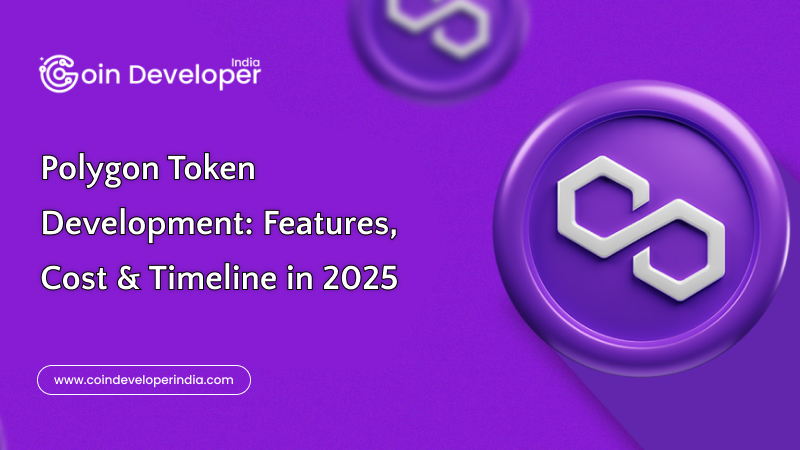Polygon Token Development: Features, Cost & Timeline in 2025
Explore Polygon token development in 2025—features, benefits, estimated cost, and timeline to launch secure, scalable tokens for DeFi, NFT, and Web3 projects.
 Polygon, formerly known as Matic Network, has really made a name for itself as a robust Layer 2 scaling solution for Ethereum. It’s all about faster transactions, lower gas fees, and better interoperability. With blockchain technology becoming popular in 2025, more and more businesses and startups are looking to Polygon to develop tokens that can power secure, scalable, and budget-friendly decentralized applications (dApps), DeFi platforms, and NFT marketplaces.
Polygon, formerly known as Matic Network, has really made a name for itself as a robust Layer 2 scaling solution for Ethereum. It’s all about faster transactions, lower gas fees, and better interoperability. With blockchain technology becoming popular in 2025, more and more businesses and startups are looking to Polygon to develop tokens that can power secure, scalable, and budget-friendly decentralized applications (dApps), DeFi platforms, and NFT marketplaces.
In this guide, we’ll dive into the essential features of Polygon token development, discuss the costs involved, and outline the general timeline for development. This way, you’ll be well-equipped to make smart choices for your Web3 project.
What is Polygon Token Development?
Polygon token development is all about creating unique cryptocurrencies—whether they're fungible or non-fungible—on the Polygon blockchain. This is done using Ethereum-compatible token standards like ERC-20, ERC-721, or ERC-1155. With its impressive scalability, high throughput, and minimal transaction fees, Polygon has quickly become a favorite among developers looking to build decentralized applications.
Common use cases for Polygon tokens include:
- DeFi applications and protocols
- NFT marketplaces
- Gaming platforms (GameFi)
- Crowdfunding and ICOs
- Loyalty and rewards systems
Core Features of Polygon Token Development
Ethereum Compatibility
Polygon is designed to work seamlessly with the Ethereum Virtual Machine (EVM), making it easy to migrate or integrate Ethereum-based dApps and tokens.
High Throughput and Scalability
With the ability to handle up to 65,000 transactions per second (TPS) on a single side chain, Polygon is perfect for large-scale applications.
Low Transaction Fees
Unlike Ethereum, Polygon has significantly lower gas fees, which not only enhances the user experience but also cuts down on operational costs.
Security and Customizability
You can deploy secure smart contracts on Polygon, complete with customizable tokenomics, governance models, vesting schedules, and anti-whale mechanisms.
Interoperability
Polygon facilitates cross-chain communication and integration with various blockchains through its Plasma and PoS chains.
Environmentally Friendly
By using a proof-of-stake consensus mechanism, Polygon reduces its environmental impact compared to traditional proof-of-work chains.
Cost of Polygon Token Development in 2025
When it comes to developing a Polygon token, the cost really depends on how complex you want to make it, what custom features you might need, and additional services like audits or integrations. Here’s a rough estimate of what you can expect:
Basic ERC-20 token:
If you want to create a straightforward fungible token on Polygon with the essential features (such as name, symbol, total supply, etc.), you’ll be looking at a price range of around $500 to $1,500.
Advanced tokens with smart contracts:
For tokens that come with custom smart contracts including features like vesting, burn mechanisms, staking rewards, and anti-bot measures, the cost can range between $2,000 to $5,000.
NFT development (ERC-721 or ERC-1155):
If you’re getting into NFT smart contract development, which includes metadata, minting logic, and marketplace integration, expect to spend $3,000 to $6,000.
Full dApp + token ecosystem:
If your goal is to build a complete ecosystem that includes tokens, wallet integration, dashboard, and backend APIs, you should budget for costs ranging from $8,000 to $20,000.
Note: it’s always a good idea to partner with a trusted Polygon development company that offers code auditing and support after deployment.
Timeline for Polygon Token Development
The timeline for developing a Polygon token depends on the scope and features required. Here’s a typical estimate:
- Basic Token (ERC-20): 2–5 days
- Advanced Custom Token: 7–14 days
- NFT Smart Contract + Metadata Setup: 10–20 days
- Token with Web3 Dashboard + Wallet: 3–5 weeks
- Full DeFi/NFT Platform on Polygon: 1–2 months
Phases of Development:
- Requirement Analysis
- Getting a clear understanding of the project scope, tokenomics, usability, and compliance requirements.
- Smart Contract Development
- Crafting secure smart contracts that handle token logic and testing them thoroughly.
- Deployment and Testing
- Launching the token on the Polygon testnet, auditing, and then rolling it out to the mainnet.
- Frontend/Backend Integration
- If needed, we will integrate the token into your wallet, dApp interface, or dashboard.
- Post-Launch Support
- Providing updates, fixing bugs, and tracking the health of the smart contract.
Why Choose Polygon for Token Development?
- Active developer community
- Trusted by top projects like Aave, Decentraland, and OpenSea
- Strong infrastructure and toolsets
- Backed by global exchanges and VC firms
Conclusion
Polygon token development in 2025 presents an exciting blend of performance, cost-effectiveness, and security. If you’re ready for a DeFi launch, NFT project, or utility token, using Polygon can help you move quickly while keeping expenses under control.
To make yourself successful, it’s important to partner with an experienced Polygon token development company that can provide you with secure, scalable, and audit-ready solutions from initial idea to deployment.
If you’re looking for a reliable partner, Coin Developer India is a best Polygon token development company. With extensive knowledge in smart contract development, custom token creation, and comprehensive dApp solutions, they empower startups and enterprises to launch robust blockchain projects on Polygon.